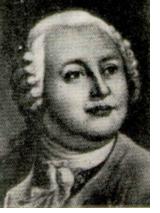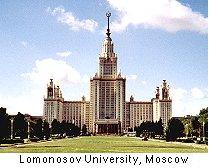Mikhail Vasilyevich Lomonosov
Poet, scientist and linguistic reformer, b. 19 (8*) November 1711 (near Kholmogory, Russia), d. 15 (4*) April 1765 (St. Petersburg).
 Mikhail Lomonosov was the son of a poor fisherman. At the age of ten he became a fisherman himself. The young Mikhail had a thirst for knowledge, and in the few hours he could spare he read every book he could get. At the age of nineteen he decided that he had to go to Moscow to make any progress and left his village on foot and without a single coin in his pocket.
Mikhail Lomonosov was the son of a poor fisherman. At the age of ten he became a fisherman himself. The young Mikhail had a thirst for knowledge, and in the few hours he could spare he read every book he could get. At the age of nineteen he decided that he had to go to Moscow to make any progress and left his village on foot and without a single coin in his pocket.
By disguising his family background Lomonosov managed to get accepted into the Slavonic-Greek-Latin Academy. He could barely support himself, and his noble fellow students constantly hassled him; but in five years he had covered the eight-year course of study, and he had taught himself Greek and studied the philosophical classics.
It was a time when the tsar Peter I had called on all learned men to unite and transform the great nation, while the aristocracy and the church openly opposed the spread of education, fearing the loss of their privileges. But the Academy's lecturers could no longer ignore Lomonosov's achievements, and in 1736 he was admitted to St. Petersburg University. Lomonosov, however, decided to go to Germany. Three years of study at the University of Marburg were followed by two years at the mining and glass-making academy of Freiburg.
In 1741 Lomonosov returned to the Academy of St. Petersburg, where he was confronted again with the hostility of the aristocracy. His frustration over the incompetence of the directorial board and his volatile temper brought him into difficulties, and in May 1743 he was sent to prison. He used the time to refine his life's work plan, already drafted in Marburg, which concentrated on the question of the structure of matter.
Lomonosov was an accomplished poet, and two odes sent to empress Elizabeth secured his release in January 1744. His 276 zametok po fizike i korpuskulyarnoy filosofi ("276 Notes on Corpuscular Philosophy and Physics") led to his appointment as professor at the Academy in 1745. He translated foreign works into Russian and wrote works in Latin on thermodynamics, electricity and the properties of air, which the Academy published on the recommendation of Lomonosov's close friend Leonard Euler.
In 1748 the Academy granted Lomonosov the funds to build a laboratory, and Lomonosov could finally delve into the study of nature himself. Within three years he performed over 4,000 documented experiments, which led to the establishment of a glass works and the production of coloured glass.
Lomonosov now concentrated on the handing over of his knowledge to future generations. He wrote an introduction to physical chemistry, a Russian grammar and on the order of empress Elizabeth a short Russian history. He drew up the plans for the University of Moscow and monitored its development from 1755.
In 1757 Lomonosov became a councillor of the Academy. In the years that followed he concentrated on the geography, geology and oceanography of the Polar Seas and published works on the navigation, research voyages and mineral wealth of Russia's northern regions. He was elected a member of the Swedish Academy of Sciences and of the Academy of Bologna.
Although Lomonosov was now recognised as an outstanding intellectual in Russia, the Russian nobility hated his materialist and humanist ideas and continued to persecute him at every occasion. When his patron empress Elizabeth died in 1762 (1761 in the old calendar), the strain on his life intensified, and after three years Lomonosov died exhausted at the age of 51. Empress Catherine II the Great ordered a state funeral to honour the "court poet", but to prevent the spread of his ideas and defend the system of serfdom she saw to it that all his notes were confiscated.
 A biography of Mikhail Lomonossov appeared in 1937. Lomonosov's complete works were finally published in 11 volumes, Latin and Russian, by the Soviet Union during 1950 - 1983, some 200 years after they were written. The University of Moscow is now named Lomonosov University, and the village of his birth near Arkhangelsk on the White Sea is now named Lomonosovo.
A biography of Mikhail Lomonossov appeared in 1937. Lomonosov's complete works were finally published in 11 volumes, Latin and Russian, by the Soviet Union during 1950 - 1983, some 200 years after they were written. The University of Moscow is now named Lomonosov University, and the village of his birth near Arkhangelsk on the White Sea is now named Lomonosovo.
* Russian date of the time. The calendar used in Europe did not come into force in Russia until 1918.
home
 Mikhail Lomonosov was the son of a poor fisherman. At the age of ten he became a fisherman himself. The young Mikhail had a thirst for knowledge, and in the few hours he could spare he read every book he could get. At the age of nineteen he decided that he had to go to Moscow to make any progress and left his village on foot and without a single coin in his pocket.
Mikhail Lomonosov was the son of a poor fisherman. At the age of ten he became a fisherman himself. The young Mikhail had a thirst for knowledge, and in the few hours he could spare he read every book he could get. At the age of nineteen he decided that he had to go to Moscow to make any progress and left his village on foot and without a single coin in his pocket. A biography of Mikhail Lomonossov appeared in 1937. Lomonosov's complete works were finally published in 11 volumes, Latin and Russian, by the Soviet Union during 1950 - 1983, some 200 years after they were written. The University of Moscow is now named Lomonosov University, and the village of his birth near Arkhangelsk on the White Sea is now named Lomonosovo.
A biography of Mikhail Lomonossov appeared in 1937. Lomonosov's complete works were finally published in 11 volumes, Latin and Russian, by the Soviet Union during 1950 - 1983, some 200 years after they were written. The University of Moscow is now named Lomonosov University, and the village of his birth near Arkhangelsk on the White Sea is now named Lomonosovo.